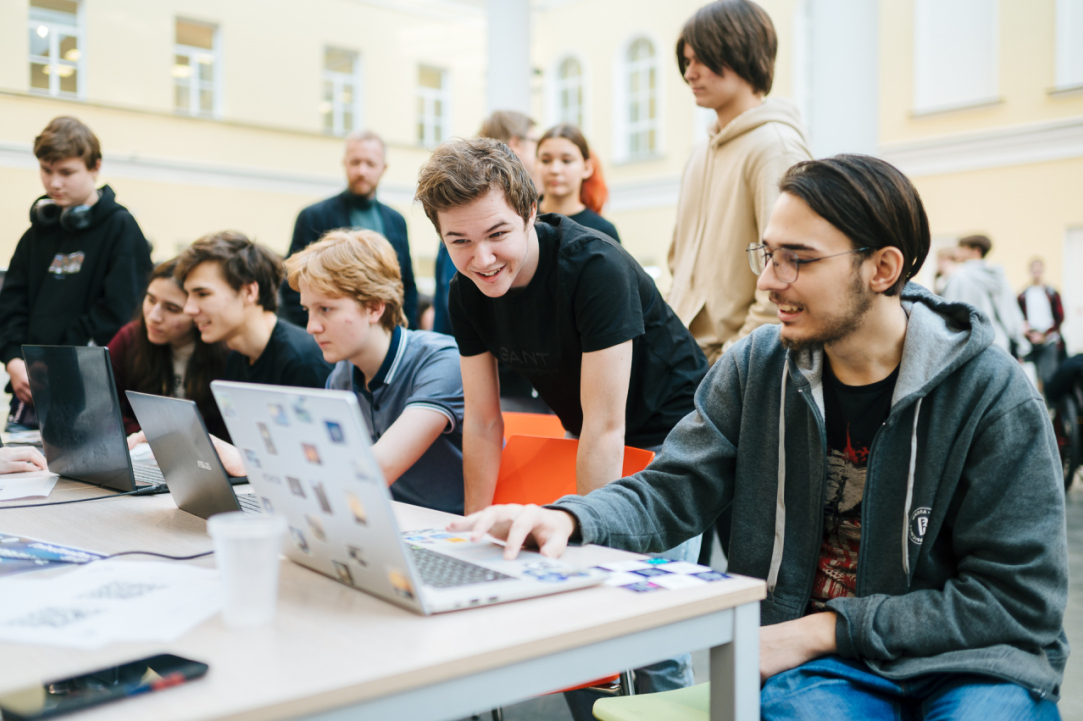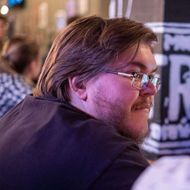Victory in Life and in Games: GameDevFest Held at HSE

The second GameDevFest, a festival for computer game developers organised by the HSE Faculty of Computer Science (FCS), took place at the Pokrovka campus. Student developers showcased demo versions of their games, while guests and organisers discussed the state of the industry, opportunities for gamification, and game development education.
VR Games, Puzzles, and Strategies
The festival showcased computer games developed by school pupils, students from the HSE Lyceum, HSE University, and other educational institutions. Dozens of laptops were set up in the atrium, allowing visitors to try out any game they fancied. Attendees could immerse themselves in virtual underwater worlds, detective stories, and battles with fantastical monsters. Some young developers even turned ordinary maths lessons into interactive game quests.
The games competed for the Best Game Project award, presented by the HSE Faculty of Computer Science. The winners were chosen through public voting.
For many students, the projects on display formed their bachelor’s or master’s theses. One of them was ERAS of REIGN developed by Andrey Shtanov, a master’s student in the System and Software Engineering programme. In this political strategy game, players assume the role of a leader in a fictional world, engaging with leaders of other nations, making peace treaties or waging wars, conquering territories, and building industrial facilities.

Visitors could also immerse themselves in the world of gaming at the VR game stand. School students Arina and Sofia shared that their teachers had recommended attending GameDevFest. ‘It is really interesting here. There are so many different games, and we got to try a VR headset. We loved it, even though it was a bit unusual,’ one of them admitted.
Beyond digital entertainment, the atrium also featured board games and even a classic game of Battleship.
At the MTS stand, visitors could play video games using the MTS Fog Play platform. This cloud gaming service caters to those without high-end computers but who still want to enjoy popular new releases. Users can rent games hosted on specialised servers, while others can offer their games for rental, setting their own prices. This model, known as ‘fog gaming,’ enables anyone to play computer games directly via a browser or app, without the need for specialised hardware.
Berloga, School Students, and Educational Programmes
The festival attracted teachers, school pupils, and their parents, offering not just games but insights into specialised education opportunities.
Denis Pozdnyakov, a lecturer at the School of Software Engineering, and Petr Skovorodnikov, a senior lecturer at the HSE Art and Design School, introduced a new joint bachelor’s programme: ‘Game and Digital Product Development,’ offered by the Faculty of Computer Science and the Art and Design School.

Denis Pozdnyakov
Denis Pozdnyakov highlighted that game development can be mentally demanding due to the intensive workload. As technology advances, the market becomes increasingly competitive. This new academic programme aims to address modern challenges, preparing interdisciplinary specialists capable of developing digital products and computer games as producers, product owners, or project managers.
The programme emphasises a project-based approach, with students learning the fundamentals of programming and design through practical coursework. Theses are also carried out as projects. There are two pathways for admission: the ‘Software Engineering’ track, requiring exams in mathematics, computer science, and Russian, and the ‘Design’ track, which requires literature, Russian, and a creative competition.
Festival visitors also had the chance to explore courses from the Moscow School of Programmers and learn about the Berloga national cyber-physical platform, which features educational games covering subjects from natural sciences to engineering and programming.
The Present and Future of Game Development
As part of GameDevFest, an open lecture series featured industry professionals discussing the future of game development, in-demand skills, and strategies for creating commercially successful games.
Alexey Drokonov, an educational project manager at VK Play, spoke about the benefits of the VK Play Laboratory, designed to support student game projects. It helps attract audiences and gather feedback, with student participation based on a competitive selection process. Projects are assessed on gameplay quality, audio, graphics, and development potential. Judging criteria include audience engagement, feedback, and time spent on game demos. Top projects receive expert support, while those not making the finals can refine their demos and reapply the following year.
Maria Budilova, HR manager at 1C Game Studios, discussed the current demands of the game development job market. The industry needs programmers, video producers (responsible for cutscenes), animators, technical artists (optimising game performance), testers, game designers, 2D artists, and 3D modellers. A common challenge is the unrealistic expectations of job applicants—for example, testers often think they will spend most of their time playing finished games, while 2D artists hope to create original artwork instead of assigned tasks. Maria Budilova advised aspiring professionals not to shy away from new experiences, even unpaid internships, as a way to adapt to the field.
A ‘Reverse Computer’ and Full Gamification
GameDevFest also hosted panel discussions, one of which featured a unique participant: Neira Virtual, a digital character created using neural network technologies by theatre director Rudolf Sarkisov. Neira’s facial expressions, hairstyle, and voice were generated with tools like Midjourney and D-ID Studio. Neira can host events, make friends, and talk. Her creators describe her as a ‘reverse computer’—a digital being adapted to our reality.
The real-life panellists agreed that AI should be used in game development to save time, enhance game mechanics, and capitalise on accessible neural network tools. Timur Shovgurov, head of the 3D & GameDev department at Nanosemantics Lab, stated, ‘Not using AI is bad form nowadays—you can already create market-level animations with neural networks. Humans should focus on thinking, while AI does the manual work.’
Another panel explored the government’s role in the development of the Russian game industry and gamification.

Vladimir Agarev
Vladimir Agarev, an HSE game design lecturer, noted, ‘Gamification did not emerge out of nowhere. As more people started playing games, certain cyclical daily behaviours became habitual.’ He pointed out that familiar game mechanics now appear in non-gaming apps—for instance, food delivery apps offering promo codes as rewards for repeat orders. The goal of gamification, Vladimir Agarev said, is to simplify everyday tasks, ensuring the core app functions smoothly while the game mechanics enhance, rather than hinder, user experience.
Gamification in education was met with a mixed reception. Some worry it might reduce cognitive performance among schoolchildren. However, Vladimir Agarev suggested a different perspective: ‘Today’s students have to memorise vast amounts of information. Game-based applications can actually make this process easier,’ he argued.
The Winners
The festival concluded with an awards ceremony. The game that received the most votes was Tactical Field, a first-person tactical shooter developed by Sergey Dray, a student at Leonov University of Technology.
‘I met many interesting people here and connected with industry professionals,’ said Sergey Dray. ‘People liked my game, and that motivates me to keep going. Meanwhile, everyone who showcased their work here is already a winner in some way because each project is impressive.’
Text by Varvara Mikhailova, Fyodor Artyushenko, and Varvara Neverova, research interns at the HSE Laboratory for Economic Journalism
See also:
'My Dream Is for Game Development to Become a Distinct Scientific Field'
Ilya Semichasnov initially planned to focus on cyber security but discovered greater potential in game development. In this interview with the HSE Young Scientists project, he discusses Bear Head Studio—an indie studio run by students, the corporate culture of humility, and playing airsoft as a way to prevent burnout.
HSE Presents Claw Engine at Major Gaming Industry Expo
From November 29 to December 1, 2024, members and participants of the ‘Game Engineering and Interactive Systems’ workshop at the HSE Tikhonov Moscow Institute of Electronics and Mathematics (MIEM), took part in the largest gaming event of the year—RedExpo. Together with the student indie studio Bear Head Studio, they showcased their proprietary development, the Claw Engine, a generative AI-powered tool for game creation. This year, the workshop continues to refine the product and is already working on its first game using the engine.
Engine for Game Development Created at HSE University
The ‘Game Engineering and Interactive Systems’ workshop team of the HSE Tikhonov Moscow Institute of Electronics and Mathematics (MIEM) invites everyone to participate in testing the Claw Engine, the first version of their game development program. This new tool allows for processing three-dimensional images and programming one’s own scripts.
The Witcher Cookbook and Human Jaws: Game Future Fest 2024 Held at HSE University
On May 25, HSE Art and Design School held an annual festival dedicated to video games and geek culture—Game Future Fest 2024. Gamers, developers, designers, potential investors and employers, as well as those interested in game dev, gathered to play, support student projects, attend workshops, and chat with teammates. The event was held at HSE University on Staraya Basmannaya Ulitsa.


